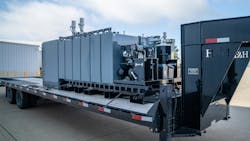Thunder Creek expands no-HAZMAT fuel solutions with new skid systems
Thunder Creek Equipment has introduced a new line of no-HAZMAT fuel and lube skids, expanding its mobile fleet service solutions to flatbeds, utility trailers, and stationary setups. The skids will help fleets refuel and perform field maintenance without the need for a CDL or HAZMAT endorsement.
The three new platforms—the Multi Tank Oil Skid (MTOS), Service & Lube Skid (SLS), and Multi-Tank Diesel Skid (MTS)—bring Thunder Creek’s proprietary multi-tank design to more flexible configurations. Each system carries fluids in tanks of 115 gallons or less to remain below HAZMAT thresholds while keeping fluids completely separated during transport.
“Thunder Creek originated the no-HAZMAT movement in the off-road heavy equipment industry with the introduction of the first multi-tank trailers almost ten years ago,” said Ben Cox, president of Thunder Creek Equipment. “This new lineup of skids will offer solutions for almost every industry where the remote servicing and management of diesel engine-driven equipment is central to success, as well as provide solutions that are not necessarily integrated into a single vehicle for their entire service life.”
Built in Pella, Iowa, the skids hold fuel, oil, DEF, and reclaim systems in one platform, streamlining mobile maintenance. The MTOS supports up to four fluids, grease kits, and optional reclaim and air compressor systems. The SLS expands that capability with configurations for up to eight fluids and multiple used-fluid reclaim options. Meanwhile, the MTS focuses solely on diesel delivery, offering up to 920 gallons of capacity and upgrades such as two-stage filtration, fuel custody meters, and 25 gpm pumps.
Each skid integrates with Thunder Creek’s existing HD jacks and accessories and can be installed on trucks, trailers, or placed on-site for stationary refueling. Because the designs avoid HAZMAT classification, any licensed employee can transport and operate them, reducing downtime and issues with compliance.
